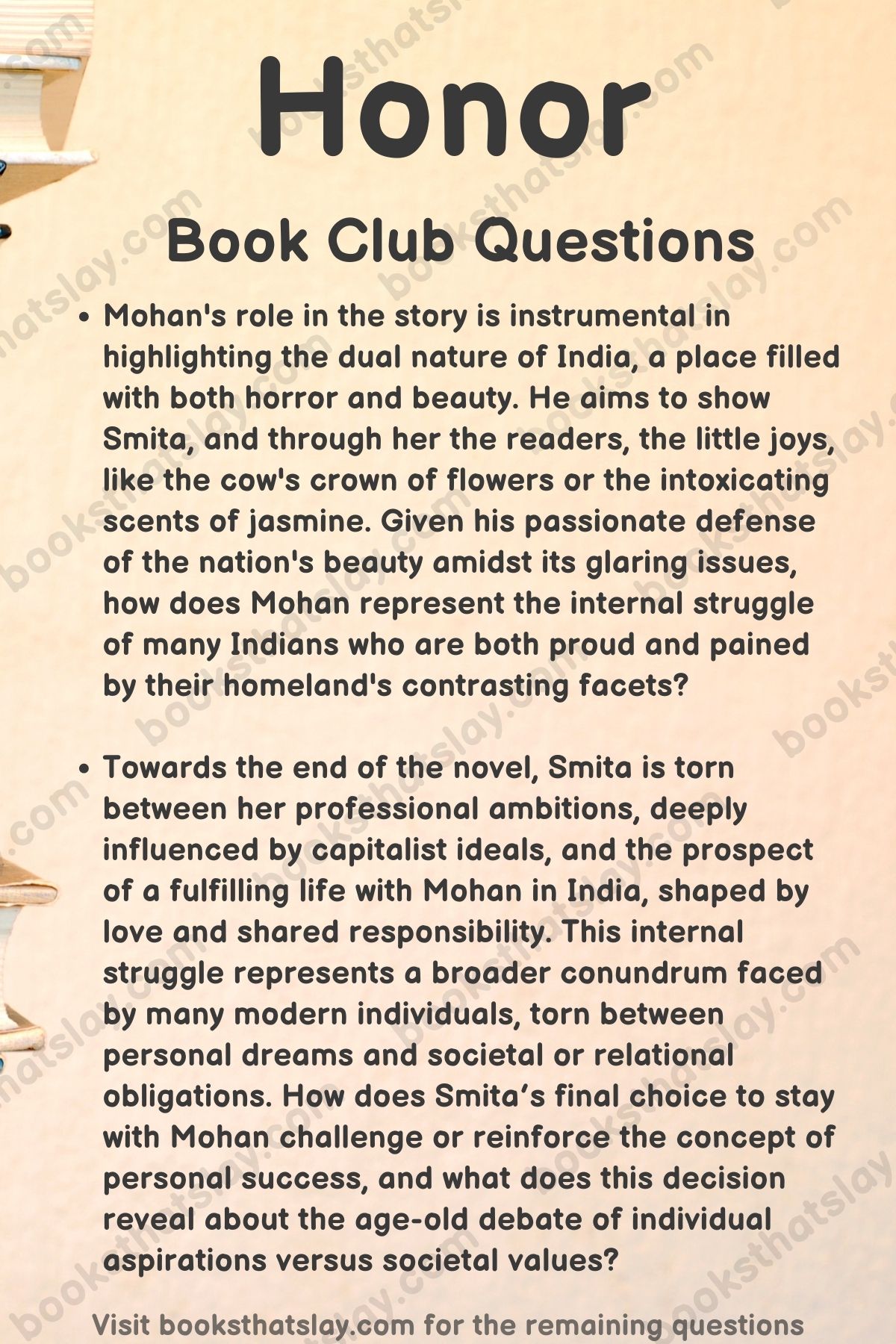10 Book Club Questions for Honor by Thrity Umrigar
When it comes to exploring the intricate nature of social norms, cultural identity, and the perpetual struggle for justice, few contemporary novels offer as nuanced a portrait as Thrity Umrigar’s “Honor.” The book masterfully weaves together multiple narratives, using the experiences of its characters to hold up a mirror to larger issues that resonate not only within the microcosm of rural and urban India but also on a universal scale.
Whether it’s the challenges faced by interfaith couples, the double-edged sword of privilege and caste, or the internal and external complexities of female oppression, the novel invites its readers to engage with the story on multiple levels.
But to truly appreciate the depth of the novel’s commentary, one needs to dig deep.
Hence, we’ve crafted a series of detailed book club questions for Honor designed to ignite conversation, provoke thought, and perhaps even inspire change.
Let’s begin exploring.

Book Club Questions for Honor by Thrity Umrigar
- The novel portrays Meena’s relationship with Abdul as not just a romantic affair but a significant challenge to the theocratic ideals prevalent in her community. Given the broader backdrop of India’s complex socio-religious issues, Meena and Abdul’s relationship serves as a microcosm of the tensions that exist between different religious communities in the nation.
How does the author use the relationship between Meena and Abdul to shed light on the larger challenges faced by interfaith couples in India, and how does this reflect on the evolving dynamics of religion and love in modern society? - Throughout the book, Smita’s perspective on India is heavily influenced by her traumatic past experiences and the prejudice she developed living away from the country. Yet, her journey with Mohan and their eventual bonding bring her closer to an understanding and acceptance of her roots, challenging her previously held beliefs.
Considering Smita’s evolution, how does Umrigar explore the idea that personal biases and prejudices can be confronted and changed through genuine human connections and confrontations with one’s past? - Mohan, hailing from a higher caste, uses his privilege not just for personal gain but to support Smita in her journalistic pursuits and to shield her in dangerous situations. His actions contrast starkly with the oppressive behaviors of Meena’s brothers and their allies.
In light of these representations, how does “Honor” delve into the double-edged sword of caste and privilege in India, both its potential for misuse and for positive intervention in a system steeped in hierarchy and prejudice? - The novel sheds light on the struggles faced by women in a society deeply rooted in patriarchy, with characters like Meena, Radha, and Smita experiencing different facets of female oppression. Their choices, resilience, and traumas illuminate the broader societal norms that impact countless women in the country.
Against the backdrop of these nuanced female experiences, how does “Honor” comment on the systemic challenges women face in India, and how do individual choices intersect with these systemic pressures? - Throughout the book, Smita’s relationship with India is layered, stemming from her traumatic childhood experiences and influenced by two decades of distance from her homeland. Her avoidance of the country, followed by her reluctant return, frames a deeper exploration of cultural identity and the influence of the past.
Given Smita’s tumultuous relationship with her roots, how does the novel “Honor” navigate the complexities of cultural identity, diaspora, and the pull between homeland and adopted country? - Mohan’s role in the story is instrumental in highlighting the dual nature of India, a place filled with both horror and beauty. He aims to show Smita, and through her the readers, the little joys, like the cow’s crown of flowers or the intoxicating scents of jasmine.
Given his passionate defense of the nation’s beauty amidst its glaring issues, how does Mohan represent the internal struggle of many Indians who are both proud and pained by their homeland’s contrasting facets? - Throughout the narrative, interpersonal dynamics, whether it’s between Smita and Mohan, Meena and Abdul, or between Meena and her brothers, are central. These relationships not only drive the plot but also serve as instruments for personal growth, reflection, and societal commentary.
Examining the various relationships portrayed in the novel, how does “Honor” underscore the significance of interpersonal connections as mirrors to societal norms, catalysts for personal growth, and as tools to challenge or reinforce societal structures? - The caste system is an undercurrent in many interactions in the novel, with characters such as the village leader still adhering to its strict rules even while perpetrating other grave injustices. This juxtaposition of power dynamics, where a powerful man still feels the need to show deference based on caste, is a nuanced reflection of Indian society.
How does the author use these character interactions to delve into the deeper societal and cultural contradictions inherent in the caste system? - Towards the end of the novel, Smita is torn between her professional ambitions, deeply influenced by capitalist ideals, and the prospect of a fulfilling life with Mohan in India, shaped by love and shared responsibility. This internal struggle represents a broader conundrum faced by many modern individuals, torn between personal dreams and societal or relational obligations.
How does Smita’s final choice to stay with Mohan challenge or reinforce the concept of personal success, and what does this decision reveal about the age-old debate of individual aspirations versus societal values? - The climax of the story, where Meena is tragically surrounded by a mob, highlights the often brutal and unforgiving nature of collective anger, especially when it clashes with judicial decisions. This raw display of mob mentality juxtaposed against the court’s not-guilty verdict ignites questions about the nature of justice and the balance of power in societies with deeply entrenched patriarchal and religious norms.
How does “Honor” critique the dissonance between legal justice and community-driven revenge, and what does this tension reveal about the broader societal values in play?
Read our discussion questions for other books